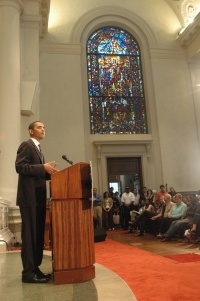c. 2008 Religion News Service
WASHINGTON _ Sen. Barack Obama said Tuesday (July 1) he would expand President Bush’s initiative to fund religious charities and community ministries and make it central to his administration should he reach the White House.
Speaking at East Side Community Ministry in Zanesville, Ohio _ a social- service provider in a battleground state _ Obama said such groups are well placed to solve the country’s most pressing problems, from poverty to the environment.
“I believe that change comes not from the top down, but from the bottom up,” Obama said, “and few are closer to the people than our churches, synagogues, temples and mosques.”
In an interview from Ohio, Obama, D-Ill., said faith-based groups can deliver more services with less bureaucratic red tape, and should not be prevented from receiving public money because of their religious affiliations.
“Frankly, in some communities,” faith-based social services “may be the only game in town,” he said. “And it’s important that we don’t leave them out as they carry on their work.”
A liberal Democrat pledging to expand a signature program of a conservative Republican president may come as a surprise, but as a former community organizer in Chicago, Obama knows personally the outsize role that houses of worship can play in their neighborhoods.
Obama is also making a heavy push to reach religious voters _ particularly Catholics and centrist evangelicals. Polls show his Republican opponent, Sen. John McCain, leading among those communities, but Obama may be quickly closing the so-called “God gap.”
The plan Obama unveiled Tuesday would expand President Bush’s Office of Faith-based and Community Initiatives, which the Illinois senator said was under-funded and “never fulfilled its promise.”
“It has to be a real partnership,” Obama said, “not a photo op.”
Bush’s faith-based initiative, which was never approved by Congress, sought to open federal funding to grassroots religious charities and community groups. But former staffers and church-state watchdogs criticized the Bush administration for improperly mixing piety and politics.
Obama, in the interview, said his proposed President’s Council for Faith-Based and Neighborhood Partnerships would not be a “radical departure” from Bush’s model, but would streamline the grant-funding process for religious groups and educate them about federal regulations.
For instance, taxpayer money would not fund proselytism, and religious groups would not be allowed to discriminate when hiring personnel for government-funded programs, Obama said.
“I’ve said very clearly I believe in separation of church and state,” Obama said in the interview, “But for us to fail to fund faith-based organizations that are on the ground doing great work day to day is counter-productive and not necessary for us to follow our Constitution.”
The Rev. Barry Lynn, executive director of Americans United for Separation of Church and State, said he was “disappointed” that Obama would “continue a failed policy of the Bush administration.”
“The president’s faith-based initiative has undermined civil rights and civil liberties and become deeply mired in partisan politics,” Lynn said. “It ought to be shut down, not continued.”
On the other hand, Nathan Diament of the Union of Orthodox Jewish Congregations worried that Obama’s plan would limit groups’ ability to hire personnel who share their faith.
“A faith-based charity should not have to forsake its religious liberty or dilute its religious character to obtain a federal grant,” Diament said.
Obama said his plan would unclog federal dollars stuck in Washington because small faith-based groups know too little about how to get government grants.
Large, experienced nonprofits such as Catholic Charities USA and Lutheran Services in America would be paid to train the smaller groups to “navigate the maze” of public funding, Obama said.
“Every house of worship that wants to run an effective program, and that’s willing to abide by our constitution _ from the largest megachurches and synagogues to the smallest storefront churches and mosques _ can and will have access to the information and support they need,” Obama said.
(OPTIONAL TRIM FOLLOWS)
Obama said he would commit $500 million per year to summer literacy programs like Philadelphia’s Take Youth Education for Tomorrow, which is run by churches and other non-profits, to serve 1 million students.
The money would come from reducing the federal travel budget and cutting “wasteful” spending, according to Obama’s campaign.
John DiIluio, President Bush’s first director of the faith-based initiative, called Obama’s plan “principled” and “prudent.”
“Many good community service initiatives can be built, expanded or sustained on the common ground that Sen. Obama has staked out for us here,” DiIulio said in a statement distributed by Obama’s campaign.
KRE/RB END BURKE750, with trim to 650 words
File photos of Obama are available via https://religionnews.com





